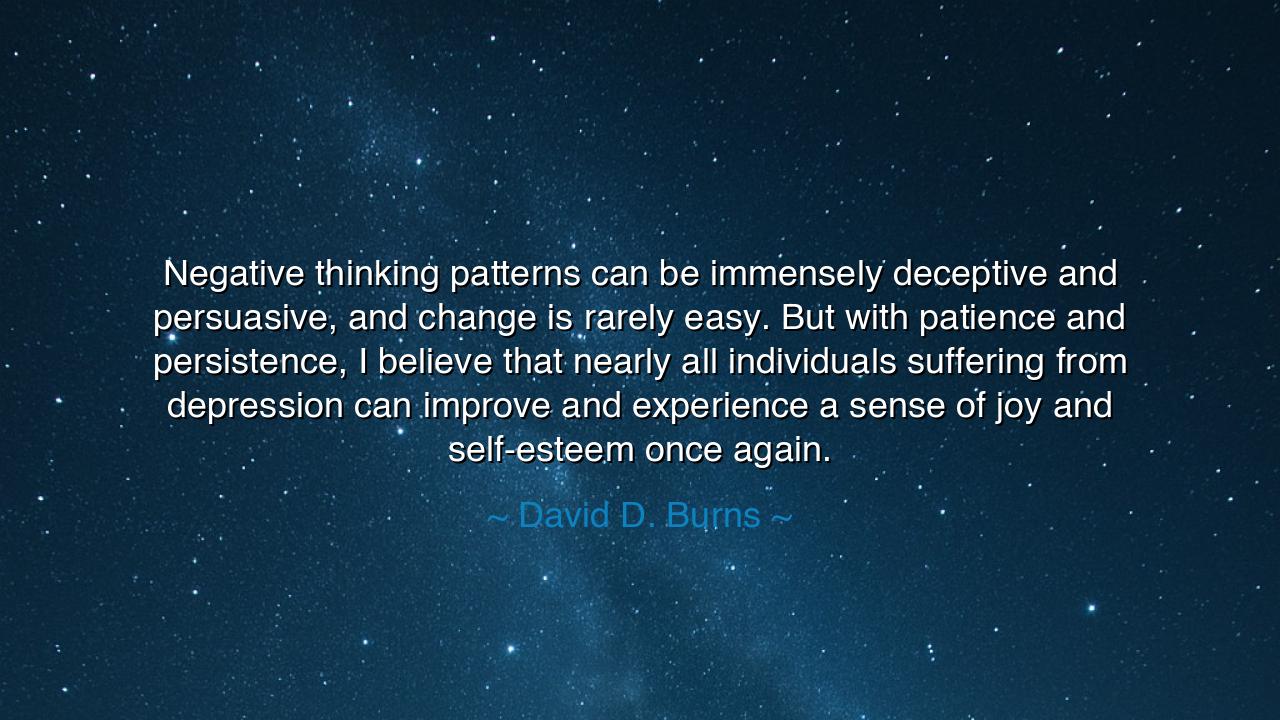
Negative thinking patterns can be immensely deceptive and
Negative thinking patterns can be immensely deceptive and persuasive, and change is rarely easy. But with patience and persistence, I believe that nearly all individuals suffering from depression can improve and experience a sense of joy and self-esteem once again.






David D. Burns, healer of minds and guide of weary spirits, once declared: “Negative thinking patterns can be immensely deceptive and persuasive, and change is rarely easy. But with patience and persistence, I believe that nearly all individuals suffering from depression can improve and experience a sense of joy and self-esteem once again.” These words, though clothed in the language of modern medicine, carry the timeless wisdom of the ancients, for they speak of the inward battle every soul must wage—the war not against nations, but against despair within the human heart.
He reminds us that negative thinking patterns are cunning adversaries. Like shadows, they whisper half-truths, distort light, and persuade us to believe that we are smaller, weaker, or more hopeless than we truly are. They are deceptive because they borrow the voice of reason, yet lead us into prisons of falsehood. They are persuasive because they thrive upon our fears, chaining us with doubts that seem too heavy to cast off. Burns, with clarity, unveils this ancient enemy of mankind: not the sword nor the storm, but the darkness of the mind itself.
Yet he does not leave us in despair. He proclaims that though change is rarely easy, it is not impossible. The ancients taught that the hardest battles yield the greatest victories. Just as the blacksmith must hammer iron again and again before it becomes a sword, so must the sufferer return daily to the struggle against despair. Each small act of courage, each attempt to rise after falling, shapes the soul into something stronger, more enduring. The journey is long, but every step matters.
Burns places before us the twin virtues of patience and persistence. Patience, for healing does not come in an instant but through steady endurance. The seed does not sprout in a day; the tree does not bear fruit in a season. Likewise, the heart that seeks healing must endure the slow and quiet work of change. Persistence, for the road is marked with setbacks, and only those who continue despite failure can reach the end. As the wise say, it is not the man who never falls who is strong, but the man who rises every time he does.
Consider the life of Abraham Lincoln, who in his youth battled profound melancholy. He called it “the black dog” that followed him. Though often burdened, he did not surrender. Through years of patience with himself and persistence in his calling, he rose from obscurity to lead a nation through its darkest trial, the Civil War. His legacy reminds us that even those shadowed by despair can bring forth light to guide millions. His triumph was not that he never felt pain, but that he endured it and kept faith with the possibility of joy.
Burns’s words hold a sacred promise: that even those caught in the grip of depression can reclaim self-esteem and discover joy once more. The path is not swift, nor is it simple, but it is real. Each effort—seeking counsel, practicing new thoughts, cultivating kindness toward oneself—is a stone laid upon the road to healing. And when the road feels endless, it is patience and persistence that sustain the weary traveler until light breaks forth again.
Therefore, O children of tomorrow, take this teaching to heart. Do not trust the deceitful voice of negative thinking. It is not your true self, but only a shadow. Arm yourself with patience, so that you do not grow bitter when progress is slow. Arm yourself with persistence, so that you do not surrender when setbacks arise. Seek help when the burden is too great to carry alone, for even the strongest warriors fight best with allies. Above all, believe—as Burns believed—that joy and self-esteem can be restored, and that no soul is beyond the reach of light.
For in the end, the greatest victory is not over others, but over despair itself. And when you rise from the battle, scarred but not defeated, you will know the sweetness of life anew, and your heart will shine as a beacon to those still wandering in the dark.






AAdministratorAdministrator
Welcome, honored guests. Please leave a comment, we will respond soon